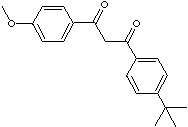PRODUCT IDENTIFICATION

H.S. CODE
CLASSIFICATION
PHYSICAL AND CHEMICAL PROPERTIES
White to off-white crystalline powder
MELTING POINT
1.037 - 1.041
SOLUBILITY IN WATER
REFRACTIVE INDEX
APPLICATIONS
Benzophenone, an
aromatic ketones (diphenyl ketone), is an important compound in organic
photochemistry and perfumery as well as in organic synthesis. It is a white
crystalline substance with rose-like odor; insolube in water; melting point 49
C; boiling point 305 - 306 C. Benzophenone is used as a constituent of synthetic
perfumes and as a starting material for the manufacture of dyes, pesticides and
drugs (especially anxiolytic and hypnotic drugs). Benzophenone is used as a
photoinitiator of UV-curing applications in inks, adhesive and coatings, optical
fiber as well as in printed circuit boards. Photoinitiators are compounds that
break down into free radicals upon exposure to ultraviolet radiation.
Photoinitiators undergo a unimolecular bond cleavage upon irradiation to yield
free radicals (benzoin esters; benzil ketals; alpha-dialkoxy acetophenones;
alpha-hydroxy alkylphenones; alpha-amino alkylphosphine; acylphosphine oxides).
Another type of photoinitiators undergo a bimolecular reaction where the excited
state of the photoinitiator interacts with a second molecule (a coinitiator) to
generate free radicals (benzophenones, amines; thioxanthones, titanocenes).
Ultraviolet radiation has more energy than visible light, and thus degrade the
physical properties such as the appearance of organic substances and plastics.
Benzophenones can act as optical filters or deactivate substrate molecules that
have been excited by light for the protection polymers and organic substances.
They, cosmetic grades, are used as sunscreen agents to reduce skin damage by
blocking UV-A, B.
Chemical ingredients for sunscreen are;
- p-Aminobenzoic acids
- p-Aminobenzoic acid (CAS #: 150-13-0)
- p-Aminobenzoic Acid, monoglyceryl Ester (CAS #: 136-44-7)
- p-Aminobenzoic Acid, octyl dimethyl Ester (Padimate 0, CAS #: 21245-02-3)
- p-Aminobenzoic Acid, ethyl dihydroxypropyl (Roxadimate, CAS #: 58882-17-0)
- p-Aminobenzoic Acid, 2,4-dihydroxy-N-(3-hydroxypropyl)-3,3-dimethylbutanamide ester
- Octyl Triazone (CAS #: 88122-99-0)
- p-Aminobenzoic Acid, PEG-25 (CAS #: 116242-27-4)
- Anthranilates
- Menthyl anthranilate (CAS #: 134-09-8)
- Benzophenones
- Benzophenone (CAS #: 119-61-9)
- 2,4-Dihydroxybenzophenone (Benzophenone-1, CAS #: 131-56-6)
- 2,2',4,4'-Tetrahydroxybenzophenone (Benzophenone-2, CAS #: 131-55-5)
- 2-Hydroxy-4-methoxybenzophenone (Benzophenone-3, Oxybenzone, CAS #: 131-57-7)
- 2-Hydroxy-4-methoxybenzophenone-5-sulfonic Acid (Benzophenone-4, Sulisobenzone, CAS #: 4065-45-6
- 2-Hydroxy-4-methoxybenzophenone-5-sulfonic Acid, Monosodium Salt (Benzophenone-5, CAS #: 6628-37-1)
- 2,2'-Dihydroxy-4,4'-dimethoxybenzophenone (Benzophenone-6, CAS #: 131-54-4)
- 5-Chloro-2-hydroxybenzophenone (Benzophenone-7, CAS #: 85-19-8)
- 2,2'-Dihydroxy-4-methoxybenzophenone (Benzophenone-8, Dioxybenzone, CAS #: 131-53-3)
- 2,2'-Dihydroxy-4,4'-dimethoxybenzophenone-5,5'-disulfonic Acid Sodium Salt (Benzophenone-9, CAS #: 76656-36-5)
- 2-Hydroxy-4-methoxy-4'-methyl-benzophenone (Benzophenone-10, Mexenone, CAS #: 1641-17-4)
- Bis(2,4-ihydroxyphenyl)Methanone (Benzophenone-11, CAS #: 1341-54-4)
- 2-Hydroxy-4-(Octyloxy)Benzophenone (Benzophenone-12, Octabenzone, CAS #: 1843-05-6)
- 2,2'-Dihydroxy-4-methoxybenzophenone [Dioxybenzone, CAS #: 131-53-3)
- 2-Hydroxy-4-methoxybenzophenone (Oxybenzone, CAS #: 131-57-7)
- 2-Hydroxy-4-methoxybenzophenone-5-sulphonic Acid (Sulisobenzone, CAS #: 4065-45-6)
- Camphors
- Benzylidene Camphor Sulfonic Acid (CAS #: 56039-58-8)
- 3-Benzylidene Camphor (CAS #: 15087-24-8)
- Polyacrylamidomethyl Benzylidene Camphor (CAS #: 113783-61-2)
- Terephthalylidene Dicamphor Sulfonic Acid (CAS #: 90457-82-2)
- 3-(4-Methylbenzyliden)Camphor (CAS #: 36861-47-9)
- Camphor Benzalkonium Methosulfate (CAS #: 52793-97-2)
- Bornelone (CAS #: 2226-11-1)
- Cinnamates
- Ethyl Cinnamate (CAS #: 103-36-6)
- 2-Ethoxyethyl-p-methoxycinnamate (Cinoxate, CAS #: 104-28-9)
- Isoamyl P-methoxycinnamate (CAS #: 71617-10-2)
- Diisopropyl Methyl Cinnamate (CAS #: 32580-71-5)
- 2-Ethylhexyl Alpha-cyano-beta-phenylcinnamate (Octocrylene, CAS #: 6197-30-4)
- Diethanolamine Methoxycinnamate (CAS #: 56265-46-4)
- Isopropyl Methoxycinnamate (CAS #: 5466-76-2)
- Isoamyl P-methoxycinnamate (CAS #: 71617-10-2)
- Glyceryl Octanoate Dimethoxycinnamate
- Ethyl Diisopropylcinnamate (CAS #: 32580-72-6)
- Ethyl Methoxycinnamate (CAS #: 99880-64-5)
- Octyl Methoxycinnamate (CAS #: 5466-77-3)
- Dibenzoylmethanes
- Dibenzoylmethane (CAS #: 120-46-7)
- Isopropyl Dibenzoylmethane (Eusolex, CAS #: 63250-25-9)
- 4-tert-Butyl-4'-methoxy-dibenzoylmethane (Avobenzone, CAS #: 70356-09-1)
- Salicylates
- 3,3,5-Trimethylcyclohexyl Salicylate (Homosalate, CAS #: 118-56-9)
- Benzyl Salicylate (CAS #: 118-58-1)
- Octyl Salicylate (CAS #: 118-60-5)
- 2-Hydroxyethyl Salicylate (CAS #: 87-28-5)
- Menthyl Salicylate (CAS #: 89-46-3)
- Isopropylbenzyl Salicylate (CAS #: 94134-93-7)
- Imidazoles
- Phenylbenzimidazole
- Phenylbenzimidazol-5-sulfonic Acid (CAS #: 27503-81-7)
- Phenylbenzimidazole Tea Sulfonate (CAS #: 73705-00-7)
- Urocanic Acid [4-imidazoleacrylic Acid, CAS #: 104-98-3]
- Ethyl Urocanate (CAS #: 27538-35-8)
- Bisymidazylate (CAS #: 180898-37-7)
- Sodium Phenylbenzimidazole Sulfonate (CAS #: 5997-53-5)
- Others
- Petrolatum Jelly (CAS #: 8009-03-8)
- Ethyl 2-cyano-3,3-diphenylacrylate (Etocrilene, CAS #: 5232-99-5)
- Diurethane Dimethacrylate (CAS #: 103597-45-1)
- Drometrizole Trisiloxane (CAS #: 155633-54-8)
- Bis(Ethylhexyloxyphenol Methoxyphenol) Triazine (CAS #: 187393-00-6
- 2-(2-Hydroxy-5-methyl-phenyl)Benzotriazole (Drometrizole, CAS #: 2440-22-4)
- Dioctyl Butamido Triazone (CAS #: 154702-15-5)
- Inorganic
compounds (physical sunscreens)
- Titanium dioxide
- Zinc oxide
APPEARANCE
White to off-white crystalline powder
ASSAY
99.0% min
ACIDITY
1.0 max (mg KOH/g)